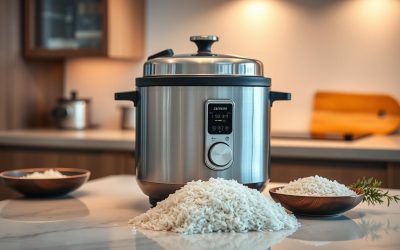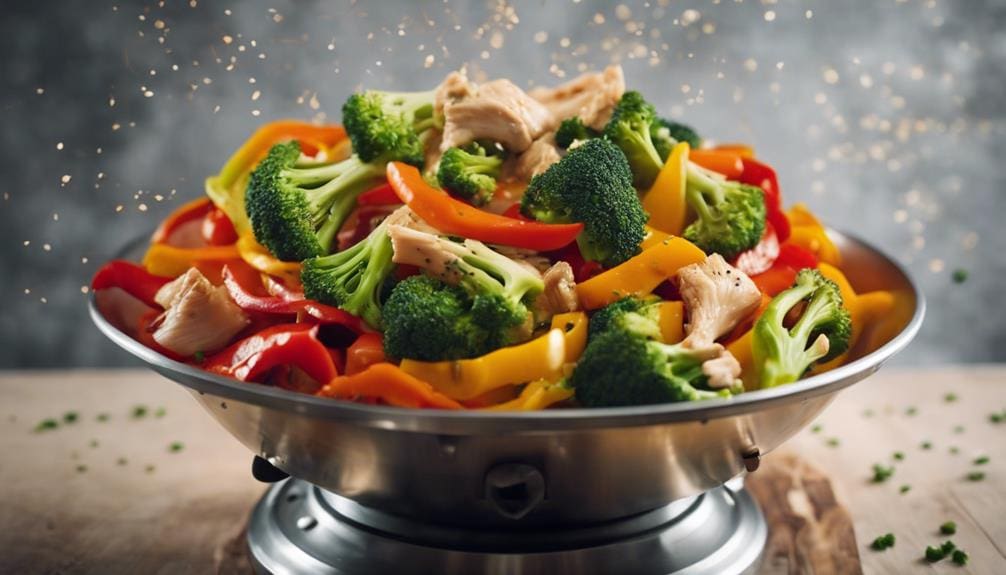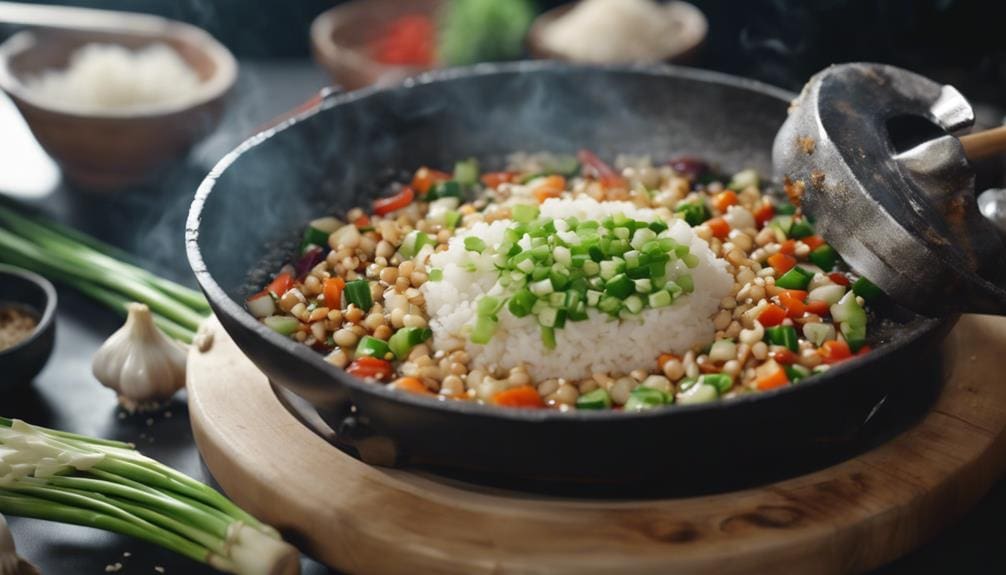Yes, dogs can eat chicken and rice. This simple combination can be a healthy and easily digestible option for your furry friend.
Chicken provides protein while rice offers carbohydrates, making it a balanced meal for dogs. It can be beneficial for dogs with sensitive stomachs or digestive issues.
However, it's essential to ensure that the chicken is cooked thoroughly and the rice is plain without any added seasonings or ingredients that may be harmful to dogs.
Always consult with your veterinarian before making any significant changes to your dog's diet.
Key Takeaways
- Dogs can safely consume chicken and rice, benefiting from the lean protein and essential nutrients these ingredients offer.
- This combination is particularly helpful for dogs dealing with digestive issues, as the gentle nature of chicken and rice can aid in a quicker recovery.
- It's important to control the portions carefully to prevent any potential health issues; experts recommend that rice intake should not exceed 10% of a dog's body weight per day.
- Chicken and rice can be a suitable choice for dogs with upset stomachs, as they provide necessary nutrients while being low in fat.
- To ensure a balanced diet for dogs, moderation is key to prevent weight gain and avoid nutrient deficiencies.
The Benefits of Chicken for Dogs
Including chicken in your dog's diet can provide a plethora of benefits, as it's a valuable source of lean protein rich in essential amino acids crucial for muscle growth and repair.
Chicken offers a nutritious and easily digestible option, making it suitable for dogs with sensitive stomachs or digestive issues. This versatile ingredient can be integrated into your dog's meals in various ways, offering both a delicious and healthy choice.
The high palatability of chicken makes it an ideal option to appeal to picky eaters or dogs with reduced appetites. By incorporating chicken into your dog's meals, you aren't only offering a flavorful dish but also supplying vital nutrients like B vitamins, iron, and zinc for their overall health and well-being.
Nutritional Value of Rice for Dogs
Rice offers a range of nutritional benefits for dogs, making it a valuable addition to their diet. It serves as a source of essential carbohydrates, providing the energy needed for your canine companion's daily activities.
Additionally, rice is rich in vital nutrients like manganese, which plays a key role in supporting overall health. Fiber present in rice aids in digestion, promoting regular bowel movements. Moreover, the iron content in rice supports the production of red blood cells, helping to prevent anemia.
Magnesium, another important nutrient found in rice, contributes to bone health and strength.
Incorporating rice into your dog's diet can provide these essential nutrients and support their well-being. However, it's important to maintain a balanced approach to prevent potential health issues like kidney stones. Monitoring the quantity of rice based on your dog's body weight is crucial to ensure they receive the necessary nutrients without excessive carbohydrate intake.
Chicken and Rice for Digestive Health
Feeding your dog chicken and rice can be beneficial for addressing digestive issues such as vomiting or diarrhea. This bland diet is gentle on the stomach, aiding in easier digestion and providing relief.
Chicken is a lean protein that's highly digestible, while rice, being low in fat and rich in starch, can help in reducing diarrhea and regulating stool output. Veterinarians often recommend this diet for 2-3 days post-stomach upset to support recovery effectively.
The easily digestible nature of chicken and rice ensures that your dog receives essential nutrients even when experiencing decreased appetite, promoting quicker recovery from digestive disturbances.
Portion Control and Monitoring Rice Intake
Make sure you're keeping an eye on how much rice your furry friend is chowing down on – it shouldn't exceed 10% of their body weight daily.
Proper portion control is key to sidestepping potential issues like kidney stones or gout due to excessive rice intake.
Balancing rice portions with protein sources like chicken is essential for your pup's overall health and well-being.
Rice Portion Sizes
Monitoring your dog's rice intake is crucial for their well-being, with a recommended limit of 10% of their body weight per day.
When serving chicken and rice meals, remember that portion size matters. While white rice is easily digestible, brown rice offers more nutrients and fiber. It's essential to balance the rice with protein, like chicken, to prevent weight gain and health issues. To maintain a healthy diet, rice should be a smaller portion compared to the protein source.
Excess rice consumption can lead to kidney stones and gout in dogs, underscoring the importance of moderation. Watching the amount of rice your dog eats is key for their overall health and diet balance.
Monitoring Rice Consumption
Keeping track of your furry friend's rice consumption is crucial for their overall health and well-being. It's important to ensure that their rice intake is in line with their dietary requirements and body weight to prevent issues like kidney stones or gout.
To maintain a healthy balance, it's recommended that rice shouldn't make up more than 10% of your dog's daily food intake based on their weight.
Regularly monitoring your dog's weight and adjusting the amount of rice they consume accordingly is essential. Consulting with your veterinarian is key to determining the right portion size of rice for your dog, taking into consideration their individual needs. This will help ensure that they receive adequate nutrition while staying healthy and maintaining a proper weight.
Remember to also consider the balance between rice and protein in their diet, as this balance is crucial for their overall well-being.
Chicken and Rice as a Recovery Diet
Feeding your dog chicken and rice is a common recommendation from veterinarians for helping with upset stomachs. This gentle and nutritious combination is easy to digest and provides essential nutrients while being gentle on the stomach.
The low fat content is beneficial for dogs dealing with digestive issues, and the high palatability can even appeal to picky eaters. The rice starch in this diet can help reduce the duration of diarrhea and stool output, aiding in a quicker recovery for your furry companion.
Remember, while chicken and rice are great for short-term recovery, they shouldn't replace a balanced long-term diet. Consult your vet on how to transition back to your dog's regular food once they're feeling better.
Chicken and Rice Recipes for Dogs
To cater to your dog's nutritional needs and sensitive stomach, experimenting with a range of chicken and rice recipes can be beneficial. Tailored to be gentle and easy to digest, these recipes are perfect for dogs with upset stomachs. They provide a balanced blend of protein from boneless, skinless chicken breasts and carbohydrates from white rice, promoting digestion and overall health.
When preparing a meal for your furry friend, ensure to cook the chicken and rice without any additional fats or seasonings. For an extra nutritious boost, you can mix in optional vegetables and supplements.
Leftover chicken and rice can be conveniently stored in the fridge for a few days or frozen for future use, making it a practical choice for busy pet parents.
Expert Tips on Feeding Chicken and Rice
When feeding your dog chicken and rice, remember that these ingredients offer essential nutrients for your pup's well-being.
Chicken provides lean protein, while rice offers easily digestible carbohydrates.
Together, they create a balanced meal that can aid in your dog's recovery from digestive issues.
Nutritional Benefits of Chicken
Incorporating chicken into your dog's diet can significantly boost their health and well-being. Chicken serves as a lean protein source rich in essential amino acids vital for muscle development and overall health in dogs.
The B vitamins found in chicken play a key role in supporting energy production and metabolism, aiding in your furry companion's daily activities. With its high protein content, cooked chicken can help your dog recover from illnesses or surgeries more effectively.
Moreover, chicken is highly digestible, making it a great option for dogs with sensitive stomachs or specific dietary requirements. Including chicken in your dog's meals can improve their coat health, skin condition, and immune function, thanks to its nutrient-dense nature.
Rice as a Staple
Adding rice, a staple carbohydrate, to your dog's diet can offer vital nutrients and energy essential for their overall health. Incorporating rice into the Chicken and Rice Diet is common as it's highly digestible and serves as a valuable source of carbohydrates for dogs.
White rice is often preferred over brown rice due to its lower fiber content and ease of digestion, ensuring that your canine companion can benefit from the energy content without experiencing digestive issues.
Rice starch not only provides carbohydrates but can also help in managing diarrhea and serves as a gentle, soothing meal for dogs with stomach upsets.
It's important to note that while rice supplies energy, it should be part of a well-rounded diet to ensure all necessary nutrients are provided for a healthy canine diet. Moderation is key when adding rice to your dog's meals to avoid potential issues like weight gain or nutrient deficiencies.
Frequently Asked Questions
Can I Feed Chicken and Rice to My Dog Every Day?
Feeding your dog chicken and rice every day may not provide all the necessary nutrients for their health. Dogs require a balanced diet that includes a variety of proteins, carbohydrates, fats, vitamins, and minerals. It is important to consult with a veterinarian to create a well-rounded meal plan tailored to your dog's specific nutritional needs.
Can I Mix Dog Food With Chicken and Rice?
Mixing dog food with chicken and rice can provide a well-rounded and easily digestible meal for your canine companion. It is important to select a dog food that meets their nutritional requirements to ensure balanced diet. When introducing this mix to your dog, do so gradually to allow their digestive system to adjust. Monitor their reaction closely to ensure they are responding well to the new meal. This combination can offer a healthy and tasty option for your furry friend.
Is It Okay to Feed My Dog Boiled Chicken Every Day?
Feeding your dog boiled chicken as the sole diet every day may result in nutritional deficiencies. Dogs require a well-rounded meal plan encompassing various nutrients like proteins, fats, and carbohydrates to thrive. It is advisable to seek guidance from a veterinarian to design a diverse and balanced diet tailored to your dog's specific nutritional requirements, ensuring their overall well-being and health.
Is Rice Ok for Dogs Daily?
Including rice in your dog's daily diet in moderation can be beneficial. Rice offers easily digestible carbohydrates and essential nutrients that can support your dog's overall health. It is important to remember that rice should make up no more than 10% of your dog's total food intake to ensure a balanced diet.
Conclusion
When your furry companion is feeling a bit under the weather or simply in need of a gentle meal, chicken and rice can serve as a soothing option.
It's essential to maintain portion control and monitor their consumption to ensure a well-rounded diet.
By incorporating the right balance of lean protein and vital nutrients, chicken and rice can provide a tasty and nourishing meal for your beloved pet.
Give this combination a try to witness the positive impact on their well-being firsthand!


